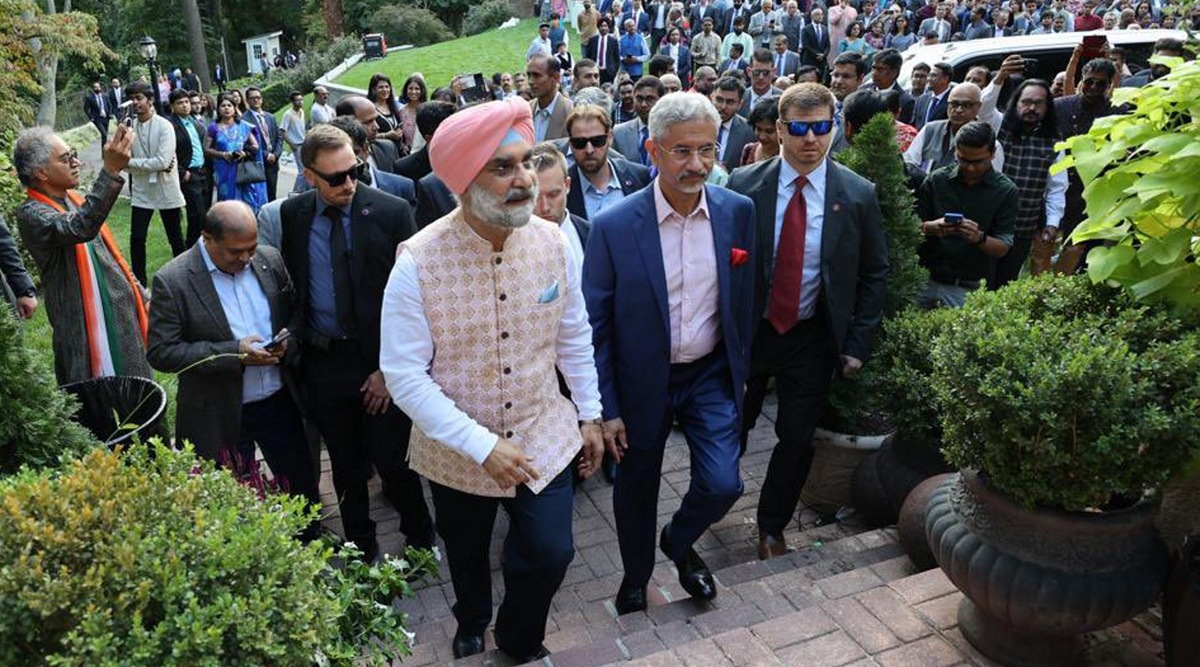DISPELLING APPREHENSION that the India-Canada diplomatic row may cast a shadow on India-US ties, External Affairs Minister S Jaishankar has emphasised that Delhi’s relationship with Washington is at an “all-time high”, and the two countries have moved to a position where they see each other as “very desirable, optimal and comfortable partners”.

“There is one clear message today, that our relationship is at an all-time high. But as they say in America, you ain’t seen anything yet. So, we are going to take this relationship to a different level, to a different place,” he said.
Story continues below this ad
 External Affairs Minister S Jaishankar and Ambassador Taranjit Singh Sandhu at a diaspora event in Washington. (PTI)
External Affairs Minister S Jaishankar and Ambassador Taranjit Singh Sandhu at a diaspora event in Washington. (PTI)
“In this changing world, I would say today that India and the US have moved to a position where we see each other as very desirable, optimal and comfortable partners with whom it’s a natural instinct today to pick up the phone, or if you meet someone, and have a natural conversation,” he said.
He said the human bond between the two countries makes the bilateral relationship unique. “Countries do business with each other. Countries do politics with each other. They have military ties, they do exercises, and they have cultural exchanges. But when two countries have that deep human bonding, that’s a completely different ballgame. That is today the defining characteristic of our relationship,” he said.
He said while people remember the US visits of former Prime Ministers Rajiv Gandhi in 1985 and Manmohan Singh in 2005, as well as Prime Minister Narendra Modi’s several visits in the past, Modi’s state visit in June was “different”. “It was different in optics, and if you ask me what has changed, I would say India and the US earlier used to deal with each other and now they work with each other,” he said.
Jaishankar’s comments hold significance amid the recent developments.
First, India-US ties have survived the strain since the Russia-Ukraine war, with the two sides cooperating to arrive at a joint communique at the G20 leaders’ summit last month.
Story continues below this ad
Jaishankar said the success of the G20 Summit could not have been possible without the support of the US. “As the host, when things go well, the host always gets the credit. It’s reasonable. But, the G20 could not have come together if all the members did not work for its success,” he said.
“The contribution, support and understanding that we got from the US to make a successful G20, I think that is something I would certainly like to recognise in public in Washington DC,” he said, amid applause from the audience.
“So, it may have been our success in a literal way, but I think it was the G20 (countries’) success. To me, it was also a success of the India-US partnership… please keep giving this partnership the support it needs, the support it deserves and the support it expects. And I can promise you that this relationship, like the Chandrayaan, will go to the Moon, maybe even beyond,” he said.
Second, the India-Canada diplomatic row had threatened to put a strain on India-US ties, but Delhi and Washington have been careful about not talking at each other — unlike what has been happening between Delhi and Ottawa.
Story continues below this ad
While Canadian Prime Minister Justin Trudeau has alleged a “potential link” between the Indian government and the killing of Khalistan separatist Hardeep Singh Nijjar, India has rejected the allegation as “absurd” and “motivated”.
Ever since the diplomatic standoff began, at least five senior US officials and diplomats — US Secretary of State Antony Blinken, National Security Advisor Jake Sullivan, National Security Council Coordinator for Strategic Communications John Kirby, US Ambassador to India Eric Garcetti and US Ambassador to Canada David Cohen — have made measured public statements, with a nuanced message for both sides. In short, asking Delhi to cooperate, but also asking Ottawa to not jump the gun.
Washington has emerged as a key interlocutor between Delhi and Ottawa — since Canada is a close US ally and India a strong strategic partner.
Jaishankar had said on Friday that the issue did come up in his discussions with Blinken and Sullivan. At the meeting, Blinken “urged” India to “cooperate fully” with the ongoing Canadian investigation.
Story continues below this ad
Responding to a question on whether the Canada issue was discussed, Jaishankar had said: “Yes, I did with Jake Sullivan and Tony Blinken… They shared US views and assessments on this whole situation and I explained to them at some length…a summary of the concerns I had. I think, hopefully, we both came out better informed.”
The fact that both sides did not mention the Canada issue in official statements and posts points to the careful diplomatic parleys in Washington DC, and the high level of trust in each other.
Jaishankar has met the top Cabinet ministers including Defence Secretary Lloyd J Austin, Commerce Secretary Gina Raimondo and US Trade Representative Katherine Tai during his US visit.



 External Affairs Minister S Jaishankar and Ambassador Taranjit Singh Sandhu at a diaspora event in Washington. (PTI)
External Affairs Minister S Jaishankar and Ambassador Taranjit Singh Sandhu at a diaspora event in Washington. (PTI)





